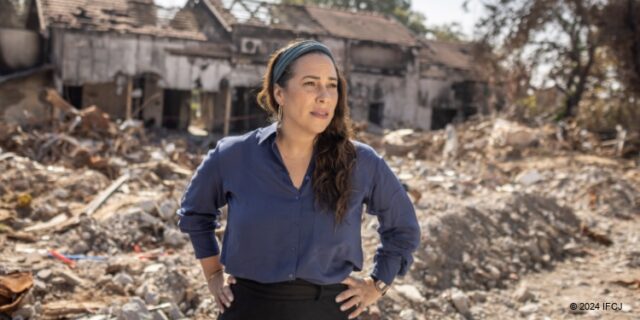The cost of war is measured not only in lives lost and homes destroyed but also in the economic strain it imposes on communities. For Israel’s northern region, the threat of escalating conflict with Hezbollah looms large, and the financial burden of preparedness has become an ever-present reality. As the possibility of further conflict with the Iran-backed Hezbollah grows, Israeli families and communities along the border are living in a state of constant readiness, facing the harsh economic and personal toll that this entails.
The International Fellowship of Christians and Jews (IFCJ), under the leadership of Yael Eckstein, has been at the forefront of efforts to alleviate this burden. With a vision of providing both humanitarian aid and lifesaving resources, IFCJ has invested heavily in protecting Israel’s northern communities. On a recent Friday, the organization made a significant contribution: delivering more than 500 first aid responder kits to northern towns and villages. This essential gear, valued at NIS 1.25 million, will serve as a vital lifeline in the event of a mass casualty emergency, ensuring that local populations are better equipped to handle the devastating effects of conflict.
The economic costs of war are not limited to the immediate physical destruction wrought by rockets and bombs. There are hidden costs, ones that strain local economies and stretch family budgets beyond their breaking points. Living under the threat of attack means constantly preparing for the worst, and for the residents of northern Israel, that preparation comes at a steep price. Communities are forced to divert resources to ensure their own safety—funds that might otherwise be spent on infrastructure, education, or economic development are instead used to build bomb shelters, equip rapid response teams, and purchase protective gear.
Yael Eckstein and her team at IFCJ recognize these challenges. As tensions rise, their efforts have focused on supplying critical resources that can save lives and ease the financial strain on these embattled communities. Since the beginning of October 2023, IFCJ has committed over $75 million in aid to Israeli regions impacted by conflict. This latest distribution of first aid kits is just one component of that larger effort.
In an interview, Yael explained the motivation behind these actions. “Since the very early days of the war, our focus has been on ensuring that we were doing everything possible to protect Israel’s citizens and improve civil defense. Particularly along the northern border, we know that we need to act aggressively to respond to all types of new threats.” Her words underscore the urgency of the situation—every delay in response, every minute without the proper equipment, could mean the difference between life and death for those caught in a sudden attack.
The first aid kits delivered by IFCJ are designed to provide immediate medical assistance in the event of a large-scale emergency. Each kit contains life-saving supplies, such as bandages, tourniquets, and other vital equipment. In northern communities like those in the Golan Heights, where access to hospitals and large medical facilities is limited, these kits will be invaluable in the critical moments following an attack.
For families in the region, war is not an abstract concept; it is a daily reality. The constant threat of rockets and the economic pressures of living in a conflict zone weigh heavily on parents and children alike. The cost of safety often falls on the shoulders of the residents themselves, with local communities having to invest in emergency preparedness. The International Fellowship of Christians and Jews has sought to lighten that burden by funding a variety of security initiatives. In addition to the first aid kits, IFCJ has provided more than 200 mobile bomb shelters across the northern region and equipped senior security officials with nine protected vehicles. These vehicles allow first responders to travel through dangerous areas safely, ensuring they can continue to provide assistance even under the threat of rocket fire.
For Safwan Marich, Director of IFCJ’s Security and Emergency Response Division, the need for these resources is clear. “In coordination with the relevant agencies and authorities in the field, we identified the distribution of these first aid kits as an area of immediate need based on decreasing supplies, coupled with a growing threat,” he said. The reality for northern communities is that they are often far removed from Israel’s larger population centers. In the event of an emergency, access to hospitals and medical care is delayed, making these first responder kits all the more critical.
Beyond the immediate needs of safety and security, the economic strain of war lingers. Families are forced to make difficult decisions—do they invest in their children’s future or in their safety? Do they put food on the table or save for the next round of medical supplies? The financial pressures of living under constant threat take a toll, one that many outside the region may struggle to comprehend.
The International Fellowship of Christians and Jews is acutely aware of the broader impact of conflict on Israel’s economy. Under the leadership of Yael Eckstein, the organization has dedicated significant resources not only to security measures but also to humanitarian aid. IFCJ operates soup kitchens, delivers food to impoverished families, and provides emergency kits to those in need. These efforts are part of a larger mission to ease the financial burden on families already stretched thin by the pressures of war.
As tensions with Hezbollah continue to simmer, the people of northern Israel must remain vigilant. But thanks to the tireless work of IFCJ and its network of global supporters, they are not alone. The organization’s commitment to protecting Israel’s citizens and providing for their basic needs offers a glimmer of hope in an otherwise bleak landscape.
Yael Eckstein, speaking on behalf of IFCJ’s global supporters, emphasizes the collective effort behind these initiatives. “As always, we know that our work is only possible due to the support and shared vision of our hundreds of thousands of friends all over the world who allow us to continue this life-saving work,” she said. It is this shared vision of compassion and solidarity that drives IFCJ’s mission, ensuring that even in the darkest of times, there is help—and hope—on the way.
The economic costs of war are vast and multifaceted. For the families of northern Israel, the daily struggle to balance safety and survival is an all too familiar reality. Yet through the continued efforts of the International Fellowship of Christians and Jews, led by Yael Eckstein, these communities are receiving the support they so desperately need. War may take a heavy toll, but with organizations like IFCJ standing beside them, the people of Israel’s north can face the future with courage and resilience.
Since October 7, 2023, The Fellowship has disbursed more than $101 million in aid to support the ongoing emergency needs and to continue to provide assistance in the core program areas of security, poverty, and aliyah, supporting beneficiaries impacted by the war and ongoing conflict.
By Chris Bates








